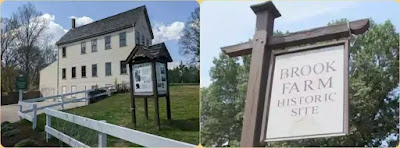Also Read
BROOK FARM.—In 1841 a number of people, headed by GEORGE RIPLEY (1802-1880), a Unitarian clergyman, purchased a tract of land of about two hundred acres at West Roxbury, nine miles from Boston. This was known as Brook Farm, and it became the home of a group who wished to exemplify in real life some of the principles that The Dial and other agencies of reform were advocating.
In The Dial for January, 1842, we may find a statement of the aims of the Brook Farm community. The members especially wanted "leisure to live in all the faculties of the soul" and they determined to combine manual and mental labor in such a way as to achieve this result. Probably the majority of Americans are in sympathy with such an aim. Many have striven to find sufficient release from their hard, unimproving routine work to enable them to escape its dwarfing effects and to live a fuller life on a higher plane.
The Brook Farm settlement included such people as Nathaniel Hawthorne, Charles A. Dana (1819-1897), afterward editor of the New York Sun, George Ripley, in later times distinguished as the literary critic of the New York Tribune, and GEORGE WILLIAM CURTIS (1824-1892), who became a well-known essayist, magazine editor, and civil service reformer. The original pioneers numbered about twenty; but the membership increased to nearly one hundred and fifty. Brook Farm had an influence, however, that could not be measured by the number of its inmates. In one year more than four thousand visitors came to see this new social settlement.
Hawthorne, the most famous literary member of the Brook Farm group, has recorded many of his experiences during his residence there in 1841:—
"April 13. I have not yet taken my first lesson in agriculture, except that I went to see our cows foddered, yesterday afternoon. We have eight of our own; and the number is now increased by a transcendental heifer belonging to Miss Margaret Fuller. She is very fractious, I believe, and apt to kick over the milk pail…. April 16. I have milked a cow!!! … May 3. The whole fraternity eat together, and such a delectable way of life has never been seen on earth since the days of the early Christians…. May 4…. there is nothing so unseemly and disagreeable in this sort of toil as you could think. It defiles the hands, indeed, but not the soul."
Unfortunately, in order to earn a living, it was found necessary to work ten hours a day in the summer time, and this toil was so fatiguing that the mind could not work clearly at the end of the day. We find Hawthorne writing on June 1 of the same year:—
"It is my opinion that a man's soul may be buried and perish … in a furrow of the field, just as well as under a pile of money." On August 12, he asks:— "Is it a praiseworthy matter that I have spent five golden months in providing food for cows and horses? It is not so." On October 9, he says:— "Our household, being composed in great measure of children and young people, is generally a cheerful one enough, even in gloomy weather…. It would be difficult to conceive beforehand how much can be added to the enjoyment of a household by mere sunniness of temper and liveliness of disposition…."
Hawthorne remained at Brook Farm for only one of the six years of its existence. An important building, on which there was no insurance, burned in 1846, and the next year the association was forced for financial reasons to disband. This was probably the most ideal of a series of social settlements, every one of which failed. The problem of securing sufficient leisure to live in all the faculties of the soul has not yet been solved, but attempts toward a satisfactory solution have not yet been abandoned.
The influence of Brook Farm on our literature survives in Hawthorne's Blithedale Romance, in his American Note Books, in Emerson's miscellaneous writings, and in many books and hundreds of articles by less well-known people. Almost all of those who participated in this social experiment spoke of it in after years with strong affection.
